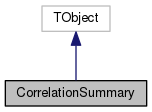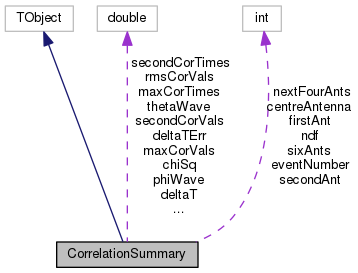 |
 |
This is a poorly thought out class that was meant to be a summary of peaks of the correlations of some antennas. More...
#include <CorrelationSummary.h>
Public Member Functions | |
| CorrelationSummary () | |
| Default constructor. | |
| ~CorrelationSummary () | |
| Destructor. | |
| CorrelationSummary (int teventNumber, int tcentreAnt, int sixAnts[6], double deltaT=0) | |
| Assignment constructor. More... | |
| void | fillErrorsAndFit () |
| The worker function that actually does the fitting. | |
| Double_t | getChiSquared (Double_t tPhiWave, Double_t tThetaWave, Int_t numAnts) |
| Tests a given plane wave hypothesis using a either six or ten antennas. More... | |
| Double_t | getDeltaTExpected (Double_t tPhiWave, Double_t tThetaWave, Int_t pairInd) |
| For a given plane wave hypothesis returns the expected time difference between one of the pairs of antennas. More... | |
| void | setFitResults (Double_t tPhi, Double_t tTheta, Double_t tPhiErr, Double_t tThetaErr, Double_t tChiSq) |
| Sets the result of an external fit. | |
| ClassDef (CorrelationSummary, 4) | |
| One of ROOT's magic macros. | |
Public Attributes | |
| int | eventNumber |
| The eventNumber. | |
| int | centreAntenna |
| The number of the centre antenna. | |
| int | sixAnts [6] |
| The numbers of the six central antennas. | |
| int | nextFourAnts [4] |
| The numbers of the four outside antennas. | |
| double | deltaT |
| The sampling period used. | |
| int | firstAnt [35] |
| There are 35 correlations formed from a set of 13 antennas (5-phi sectors). More... | |
| int | secondAnt [35] |
| The index of the second antenna in the 35 possible pairs (3 up-down, 4 left-right, 4 diagonal, 4 outside-neighbour). | |
| double | maxCorVals [35] |
| The maximumn correlation value for each of the 35 possible correlations (3 up-down, 4 left-right, 4 diagonal, 4 outside-neighbour). | |
| double | maxCorTimes [35] |
| The time of the maximum correlation value for each of the 35 possible correlations (3 up-down, 4 left-right, 4 diagonal, 4 outside-neighbour). | |
| double | rmsCorVals [35] |
| The rms correlation value for each of the 35 possible correlations (3 up-down, 4 left-right, 4 diagonal, 4 outside-neighbour). | |
| double | secondCorVals [35][2] |
| The peak of the next highest correlation values (tore both left and right vals). | |
| double | secondCorTimes [35][2] |
| The time of the next highest correlation values (tore both left and right vals). | |
| double | deltaTErr [35] |
| The error on each of the 35 deltaTs (no idea right now what this means). | |
| double | phiWave |
| The azimuthal angle of the plane wave (in payload centric coordinates). | |
| double | thetaWave |
| The elevation angle of the plane wave (in payload centric coordinates). | |
| double | phiWaveErr |
| The error on the azimuthal angle of the plane wave (in payload centric coordinates). | |
| double | thetaWaveErr |
| The error on the elevation angle of the plane wave (in payload centric coordinates). | |
| double | chiSq |
| The chi-squared of the fit. | |
| int | ndf |
| The number of degrees of freedom – no frigging idea I just make it up. | |
| Double_t | fAntPhi [35][2] |
| A lookup table for antenna postions. | |
| Double_t | fAntR [35][2] |
| A lookup table for antenna postions. | |
| Double_t | fAntZ [35][2] |
| A lookup table for antenna postions. | |
This is a poorly thought out class that was meant to be a summary of peaks of the correlations of some antennas.
This is a poorly thought outclass that was meant to be a summary of peaks of the correlations of some antennas.
Definition at line 20 of file CorrelationSummary.h.


| CorrelationSummary::CorrelationSummary | ( | int | teventNumber, |
| int | tcentreAnt, | ||
| int | sixAnts[6], | ||
| double | deltaT = 0 |
||
| ) |
Assignment constructor.
| teventNumber | The event number. |
| tcentreAnt | The centre antenna used in the correlation. |
| sixAnts | An array of the six antennas used. |
| deltaT | The sampling period used in the interpolation (or zero) |
| Double_t CorrelationSummary::getChiSquared | ( | Double_t | tPhiWave, |
| Double_t | tThetaWave, | ||
| Int_t | numAnts | ||
| ) |
Tests a given plane wave hypothesis using a either six or ten antennas.
| tPhiWave | The (payload centric) azimuthal angle of the plane wave. |
| tThetaWave | The (payload centric) elevation angle of the plane wave. |
| numAnts | The number of antennas to use in the test. |
Definition at line 82 of file CorrelationSummary.cxx.
| Double_t CorrelationSummary::getDeltaTExpected | ( | Double_t | tPhiWave, |
| Double_t | tThetaWave, | ||
| Int_t | pairInd | ||
| ) |
For a given plane wave hypothesis returns the expected time difference between one of the pairs of antennas.
| tPhiWave | The (payload centric) azimuthal angle of the plane wave. |
| tThetaWave | The (payload centric) elevation angle of the plane wave. |
| pairInd | The index of the pair (the numbering system is the 3 top bottom pairs, 4 left-right pairs, 4 diagonal pairs, plus the 4 'neighbour' + the 4 (next phi to neighbour). |
Definition at line 95 of file CorrelationSummary.cxx.
| int CorrelationSummary::firstAnt[35] |
There are 35 correlations formed from a set of 13 antennas (5-phi sectors).
For clarity in the list below the antennas are described using the following names, for cases where there is a nadir antenna in the centre phi sector we have:
For cases where there isn't a nadir antenna in the centre phi sector, then we have:
LLB LB CB RB RRB
Definition at line 154 of file CorrelationSummary.h.
 1.8.11
1.8.11